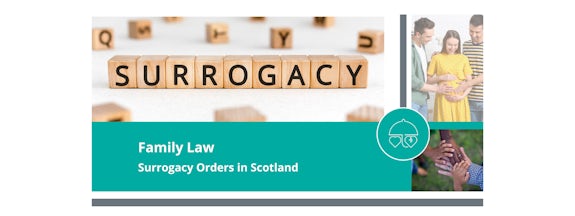
May 27, 2025

A parental order is required when a child, or children, is born to a surrogate, in order to extinguish the legal rights of the surrogate and secure the legal status of the intended parents.
One of the ‘criteria’ any such application for a parental order is that any application must be issued within six months of the birth of the child. There have been exceptions to this requirement but those have been issued by English Family Courts, until now.
A written judgement has been issued from Lady Carmichael, the case of AB and XY for orders under Section 54 of the Human Fertilisation and Embryology Act 2008. Importantly, the judgement comments on, and provides guidance in respect of, the basis on which she was prepared to accept that the applications were competently made notwithstanding the fact that they did not satisfy certain terms of the 2008 Act.
Lady Carmichael took the view that in so far as Section 54(3) is concerned, the question to be asked is whether it was the intention of Parliament that no order could be granted in the event that the time limit of 6 months was not complied with in actions such as these. A balance has to be struck between making and dealing with applications promptly and the overall consequences if it were not possible to make a competent application given that the character of the order is one which goes to the most fundamental aspects of status, identity and family and legal relationships.
In respect of Section 54(2)(c) whether the applicants are in an enduring family relationship and section 54 (4) whether the children have their home with the applicant are matters of fact. If a parental order is not made the children would not have the important social and emotional benefits of recognition of the relationship with their parents. Their day to day reality would not match their legal reality.
Interestingly, the petitioners did not have the benefit of legal advice when they agreed to proceed with surrogacy, their primary focus being on the practical matters surrounding conception. The children were conceived and born during the pandemic and by the time the petitioners sought legal advice, the 6 month period had already ended. Accordingly, the judge was satisfied that the expiry of the 6 month period should not act as a bar to the order sought being made. The petitioners also had an amicable separation and describe themselves as committed co-parents and accordingly the applications were granted.
This case helpfully sets out the approach being adopted by the courts where issues such as these arise. The court have expressed the importance of a Parental Order in providing the child with an identity and recognising their family composition.
If you would like further information regarding the topic discussed in this blog, please contact Sarah Feeney by email – sfeeney@gilsongray.co.uk or telephone 0141 530 2021
You can also visit our Family Law Team page for more information here.
The information and opinions contained this blog are for information only. They are not intended to constitute advice and should not be relied upon or considered as a replacement for advice. Before acting on any information contained in this blog, please seek solicitor’s advice from Gilson Gray.

Sarah is an Associate with Gilson Gray. She is accredited by the Law Society of Scotland as a mediator and is also a trained collaborative practitioner and is a member of Consensus. Sarah is a dedicated family lawyer and has specialised in family law since 2009.